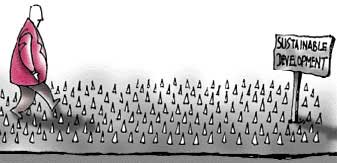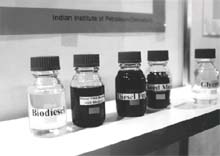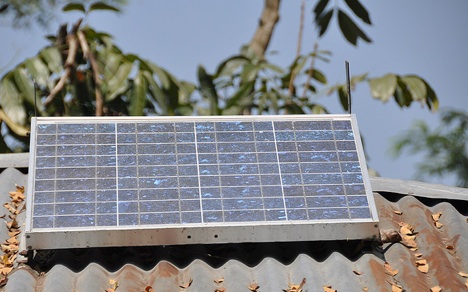
Looking ahead
A brief outline of the challenges of sustainable development in India

A brief outline of the challenges of sustainable development in India

The proposed energy tax has run into heavy weather in Europe, despite strong backing from Denmark, Germany and the Netherlands.
Now that the reality of climate change has been accepted even by its strongest sceptics, there is a rush to find answers. The latest buzz is to substitute the use of greenhouse gas emitting fossil
The informed environmentalist will find it difficult to agree with the Central Public Works Department (CPWD) decision to ban the use of wood in its buildings and -- defying all ecological logic --

<p><a href="http://scripps.ucsd.edu/">Scripps</a> researchers have identified three avenues by which countries can avoid reaching the warming threshold, a point beyond which many scientists believe climate change will present unmanageable negative consequences for society.
<p>The last two years have seen a flurry of reports that have projected the long-term greenhouse gas emissions trajectory of India, and how the country can go low-carbon and help solve the climate change crisis.
Coal power generation in China and India is expected to double and triple, respectively, over the next 20 years, increasing exposure to fuel price volatility, exacerbating local air pollution, and hastening global climate change. Concentrating solar power (CSP) is a growing source of utility-scale, pollution-free electricity, but its potential in Asia remains largely unexamined.

Thupstan Chhewang, Chief Executive Councillor and chairperson of the Ladakh Autonomous Hill Development Council LAHDC speaks to Down To Earth.

A fuel from a vegetable source that is non toxic, biodegradable and can be used in conventional diesel engines with little or no modifications
THE industrialised countries are back to their pre-Rio game of chess. They imposed their narcissistic environmental agenda on the economically atremble South by virtually bamboozling it into signing
weed killer ban

The US President is finding it difficult to strike a policy balance between protecting the endangered spotted owl and the jobs of loggers in three states.
ENVIRONMENT Minister Jairam Ramesh renewed his attack on the use of diesel of luxury cars and shrugged off protests by some manufacturers of Sports Utility Vehicles (SUV), saying the government controls the price of the fuel only to help farmers, not the rich. The government earns tax revenue from diesel sales, but does not allow its retail price to rise to the prevailing international leve

In the face of mounting criticism at home and abroad, Japan's fast breeder reactor programme is on the mat
In this day of television grabs, policies are about slugfests. The logic of the grab is that any discussion must be heated, with sharply divided positions clear proponents and opponents. It is a
Lignocellulosic biomass is the most abundant renewable resource on earth. Lignocellulosic materials, including wood, grass, forest residues, agricultural residues, pulp and paper mill wastes, and municipal solid wastes can be used for bioethanol production. Among these resources, agricultural residues, such as sugarcane bagasse, dominate in terms of tonnage and can serve as feedstock.

<p><span style="font-size:14px;"><strong>Solar Energy</strong></span></p> <p><img alt="Solar Energy" src="http://www.indiaenvironmentportal.org.in/files/country/bangladesh/solar_hl.jpg" style="width: 530px; height: 300px;" /></p> <p>In Bangladesh 60% of the population do not have access to the power grid. The country only produces 3500-4200 MW of electricity against a daily demand for 4000-5200 MW on average, according to official estimates. Solar energy is an ideal solution as it can provide gridless power and is totally clean in terms of pollution and health hazards. Since it saves money on constructing electricity transmission lines, it’s economical as well.</p>

Disposable diapers and paper cups tax the environment, yes, but washing reusable diapers and china cups is just as environment unfriendly, say recent studies. Caught in the middle of this information blitz is the consumer.
A thermal power plant (TPP) is threatening to snuff out the 100-year-old livelihood of farmers in Maharashtra's Dahanu taluka. It is alleged that pollution from the unit has led to a steady decline

The Commission on Global Governance calls for a democratic world governance to deal with increasing global interdependence